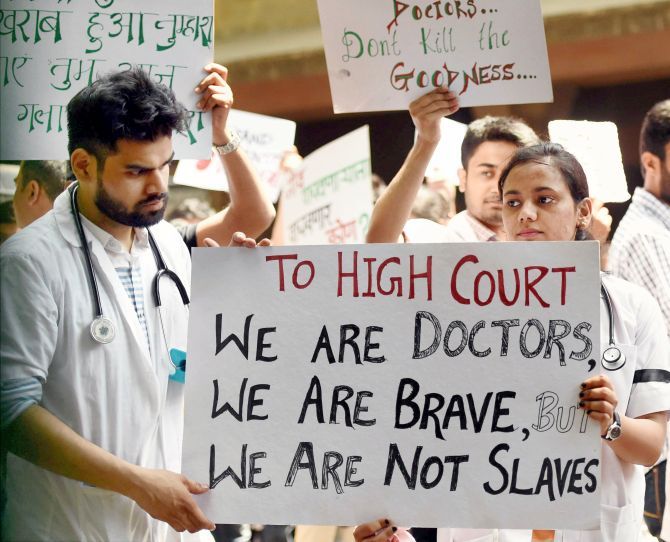Former AIIMS director Dr S K Kacker discusses the doctors' agitation in Maharashtra and West Bengal's crackdown on private hospitals with Veenu Sandhu.

For five days last fortnight, about 4,000 doctors from the Maharashtra Association of Resident Doctors remained on strike to protest against incidents of violence against them by relatives of patients.
They called the strike off only after Maharashtra Chief Minister Devendra Fadnavis gave them an ultimatum to resume duty or face legal action.
In West Bengal, meanwhile, the assembly passed a Bill to regulate private hospitals in the state. Under the new law, the state will oversee private health care facilities and decide how much they can charge and review how they deal with complaints from patients.
Dr S K Kacker, director, Delhi ENT Hospital & Research Centre and former director of the All India Institute of Medical Sciences, Delhi, speaks on the two issues.
What are your views on doctors going on strike, like they did in Maharashtra, to protest against attacks on them?
When a patient is brought into hospital in a critical condition and later dies in spite of being treated, how is it the fault of the doctor? Beating the doctor cannot be justified when he has done his duty responsibly and in spite of his best efforts, a tragedy has occurred.
The strike took place because younger doctors are feeling that adequate importance is not being given to their grievance. The protest is a way of establishing their importance, of driving home the message that doctors shouldn't be targeted. However, because the doctors are feeling insecure and have gone on strike, a large number of people are suffering.
I shudder at this thought.
At AIIMS, instead, doctors turned up for duty wearing helmets as a sign of support for the Maharashtra doctors. They attended to patients with their helmets on.
That's a better way of protesting. Wear helmets, or black badges, but do the job because a majority of the patients are not involved in violence. So, why should they be made to suffer? I don't think a strike will sort the problem.
The doctors want the government to ramp up security and ensure their safety in hospitals. The Indian Medical Association (IMA) also wants stricter implementation of the Doctor's Protection Act. Do you think that would help?
There is no way the government can totally prevent such incidents.
You can ensure that people don't carry knives or weapons into the hospital, but how can you prevent someone suddenly turning on a doctor and hitting him?
What can the government do about this?
How will it check such individual incidents?
No director of any institute will like his doctor to be hit. But then, there is a total lack of control today. Only the other day, you had an MP threatening an airline's staff.
These are maverick elements that you can come across anywhere, anytime.
West Bengal has passed a Bill to regulate the way private hospitals function. What are your views on it?
It is a very difficult thing to implement and IMA is against it. It can only be done if the deficiency is made good by the government.
I also run a charitable hospital. We pay our staff from what we get from the patients who pay for their treatment. But for support from charity it would not have been possible to run it.
It's mostly bigger hospitals, which are supported by big money, that are charging exorbitantly. To regulate rates in smaller hospitals will be very difficult.
Just look at health insurance. For tonsillectomy, an insurance company will pay ₹45,000 for treatment at a bigger hospital and insist on giving only ₹25,000 if the treatment is in a hospital such as mine. Why?
It will give bizarre arguments for this skewed insurance amount, such as, "Your hospital is not a five-star" or that "heart surgeries are not performed at your hospital".
Now, what has tonsillectomy got to do with a heart surgery?
So what would be a better alternative?
The system in America is very good. The rates there are fixed, no matter where you get that particular surgery done.
That system should be brought in here, but in a rational way after calculating the costs involved. Or else, hospitals will compromise on the quality of the equipment they use to cut costs and this could increase the risk of infection.
This will then also lead to unnecessary manipulation of records. A lot of unnecessary surgeries will be performed and expensive drugs prescribed just to make money. They already are.
Don't also make these charges fixed because every year the cost of running a hospital also goes up.
In 1996, the electricity charges and water and house tax for my hospital came to ₹25,000. They have now gone up to ₹1.25 lakh. Similarly, staff salaries also increase every year. So, keep that in mind. You cannot have fixed charges.
Rationalise the charges, but not in a way that hospitals cannot run.











